Today technology governs healthcare. Healthcare Management Software makes working of doctors, nurses and hospitals work harmoniously. These programs available in the computer make it simpler to care about patients and work with paperwork. The U.S. market in healthcare IT software is estimated at USD 189.59 billion in 2025 according to Grand View Research and it is increasing at a rate of 15% to 15.5% from 2024-2025 to 2030. Over 88.2 percent of physicians are presently utilizing electronic systems rather than using paper records.
Healthcare Software is time-saving, minimizes errors, and assists medical personnel with their priorities on the patient to recover. These tools are transforming the manner in which healthcare is done in small clinics to large hospitals. Their use enables physicians to get patient data more rapidly, appointments facilitated effortlessly and medications being tracked both securely.
What is Healthcare Management Software?
Healthcare Management Software is a hospital/ clinic digital assistant. It retains the patient details, maintains appointments, addresses billings, and assists physicians to make superior decisions. Imagine it to be like a smart filing cabinet that is capable of a lot more than a paper file. The EHR market in the world has reached 27.1 billion dollars and is projected to rise to 30.1 billion dollars by 2025.
These applications can be used in computer systems, tablets, and mobile phones meaning that the doctors can always have access to the patient. Almost 96% of hospitals are currently utilizing certified electronic health records. Modern Healthcare Software includes features like automatic reminders, drug interaction warnings, and instant messaging between medical staff. The software assists in ensuring that patient information remains confidential and safe besides making it easy to access what is required by the authorized individuals in a short time.
Why Healthcare Management Software is Important
Healthcare facilities make everything run smoother and safer. In 2025, the industry of healthcare software has reached up to 38.50 billion, and is projected to reach 94.56 billion by 2034. These systems are able to solve numerous issues that health care workers struggle with on a daily basis.
- Speed: It is faster since it does automatic repetitive tasks such as automatic appointment reminders or automatic updates of patient records.
- Safety: Eliminates unsafe errors, such as checking drug combinations, notifying staff about allergies, and maintaining accurate medical histories of each patient.
- Money: Saves money through less paperwork, eliminating billing mistakes and enables the staff to work more effectively without hiring new staff.
- Rules: Ensures that hospitals adhere to health laws and privacy regulations and develops the records that would show that the regulations have been adhered to in case of inspection and audits.
- Care: Enhances the treatment of patients by providing the doctors with full medical histories, tests outcomes, and treatment plans all displayed on a single screen, easy to read.
Key Features of Healthcare Management Software
Modern Healthcare Software comes with important tools that make healthcare work better. Almost forty percent of EHRs have become able to integrate with telehealth platforms. All of these features collaborate in order to produce systems that can benefit patients and medical staff.
- Connection: Enables communication between various hospital systems so that information may flow freely amongst various departments, labs and external doctors without manual copying.
- Protection: The protection involves the use of powerful locks and codes to assure that patient information is not hacked by hackers and that the staff can access their requirements.
- Growth: Grows with the increase in the size of hospitals and the number of services and patients they attend without necessarily requiring a change in the whole system.
- Reports: Prepares charts and reports that assist managers in carrying out clever choices regarding the staffing, equipment, and patient care enhancements.
- Mobile: Can be used on phones and tablets to allow doctors and nurses to access patient data and update patient records as they traverse the hospital.
Types of Healthcare Management Software
Electronic Health Records (EHR) Software
EHR software substitutes the paper patient files with digital files, which are simpler to use and disseminate. The electronic health records contain all information on a patient including his or her medical history, medications, allergies, lab results, and treatment visits—all of which has increased to 88% of U.S physicians in 2010, compared to 42 percent in 2008. The EHR software is useful in guiding doctors to make better decisions through displaying full patient details in a single screen.
It also cautions physicians whether a new drug will lead to some issues with the existing drugs. Similar to Risk Management Software that helps organizations minimize uncertainties, EHR solutions enable various doctors to exchange information about patients in a fast and secure way. This is an advantage as patients receive more effective care since their entire medical history is known by all their doctors.
Hospital Management Systems (HMS)
Hospital Management System assists large hospitals to run smoothly by controlling all their day-to-day activities. This system addresses admission of patients, room allocation and schedules of staff and equipment location in one system. The market of hospital management software will continue to rise to 25 billion in 2024 to 67.87 billion in 2033.
HMS software enables hospital managers to be aware of rooms available, the staff on duty and supplies that are low. It is also used to monitor the waiting time of the patients in order to get the hospitals utilizing their resources in a more efficient manner. The system generates reports to assist hospital leaders in making intelligent decisions related to staffing, purchasing equipment and enhancing patient care. Many Healthcare Software Development companies are also innovating in this space, offering tailored HMS solutions that improve efficiency and patient experience.
Practice Management Software
Practice Management Software assists the small clinics and doctor offices to manage their business in a better way. It also has automatic handling of appointment scheduling, patient check-ins, insurance claims, and bill payments. Understanding what is practice management software in healthcare shows it focuses on the business side of medical practices rather than just medical records. Automatic reminders of the patients on appointments and follow-ups are sent by the software.
Telemedicine Software
Telemedicine applications enable physicians to view patients over the video rather than visiting them face-to-face. This type of technology took great significance in the times of COVID-19 and is still gaining more and more popularity. The software will consist of secure video calling, transmission of digital prescriptions and monitoring of patient health remotely.
The worldwide healthcare cloud computing marketplace is expanding at 16 percent each year, with the use of EHR and telemedicine. Patients are able to view their doctors at the comfort of their homes, saving them time spent in traveling as well as making healthcare more accessible.
Top 10 Healthcare Management Software Solutions in 2025
1. Veradigm
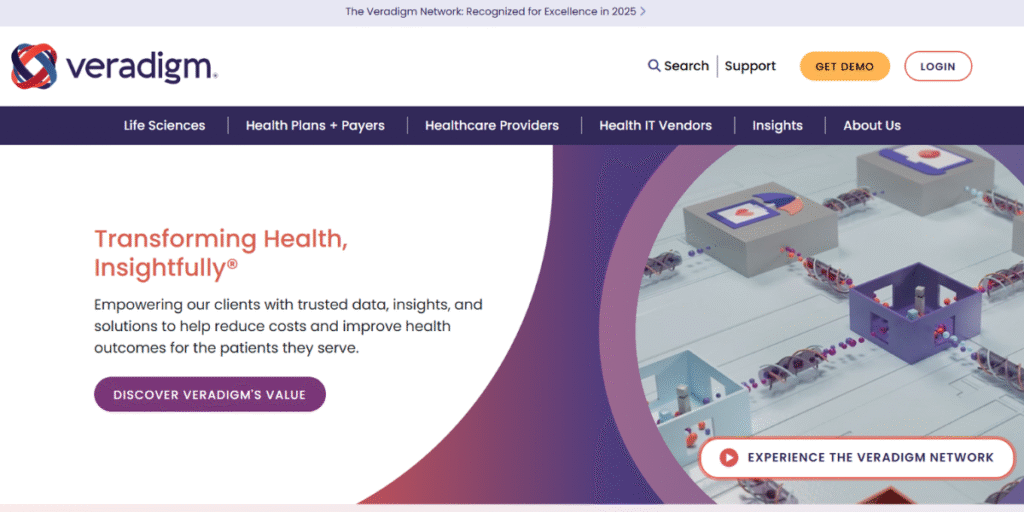
Veradigm makes Software that works well for different types of medical practices. They have created a system that integrates the business management tools with the patient records in a single user-friendly system. The software is useful in assisting the doctors to exchange information with other healthcare providers in a safe and expeditious manner. Veradigm is oriented at ensuring that the various computer systems are able to communicate.
They provide applications that are compatible with the mobile devices hence doctors can access the information about patients everywhere. They have special facilities to monitor community health and a high population of patients. The software is provided with easy-to-follow instructions that assist physicians in arriving at the decision in relation to treatment of their patients, which is founded on established medical studies.
Specialization:
- Electronic Health Records
- Practice Management
- Population Health
Founded: 1986
Headquarters: Chicago, Illinois
Best For: Multi-specialty practices
Highlights:
- System connections
- Mobile apps
- Decision support
- Community health tools
2. Epic Systems Corporation
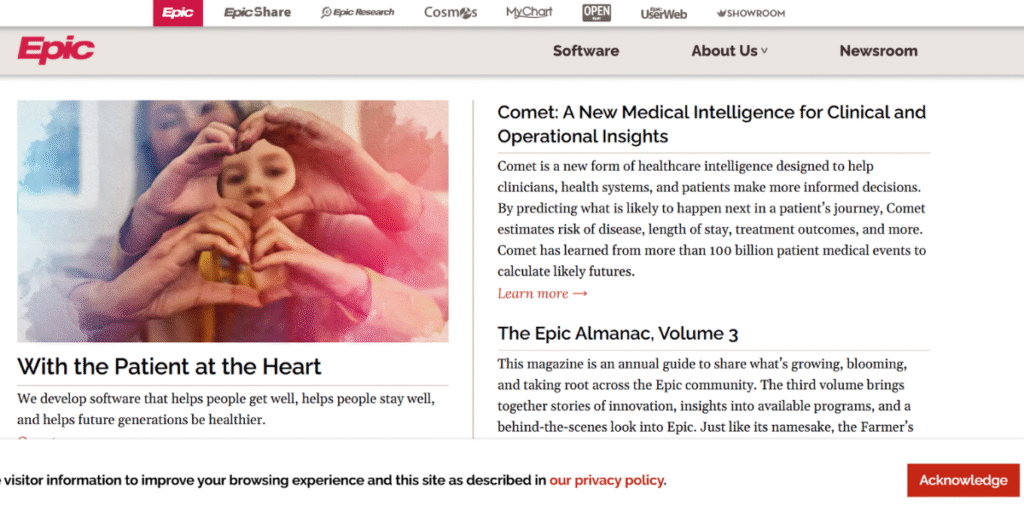
Epic creates powerful Management Software used by many large hospitals around the world. Their system processes patient records, billing and messages to patients in an all inclusive package. Epic is recognized to produce software that can be tailored to suit various needs of the hospitals.
Their MyChart patient portal also allows individuals to make appointments, review test results, and contact their physicians via the Internet. The system generates comprehensive reports that can assist hospital managers to make decisions. Epic software is compatible with other medical systems and complies with rigid security regulations. Some of the largest hospitals in America have Epic since it is capable of managing millions of patient records effectively and safely.
Specialization:
- Large Health Systems
- Electronic Health Records
- Revenue Cycle Management
Founded: 1979
Headquarters: Verona, Wisconsin
Best For: Large hospitals
Highlights:
- Complete integration
- MyChart portal
- Advanced reports
- Global use
3. athenahealth
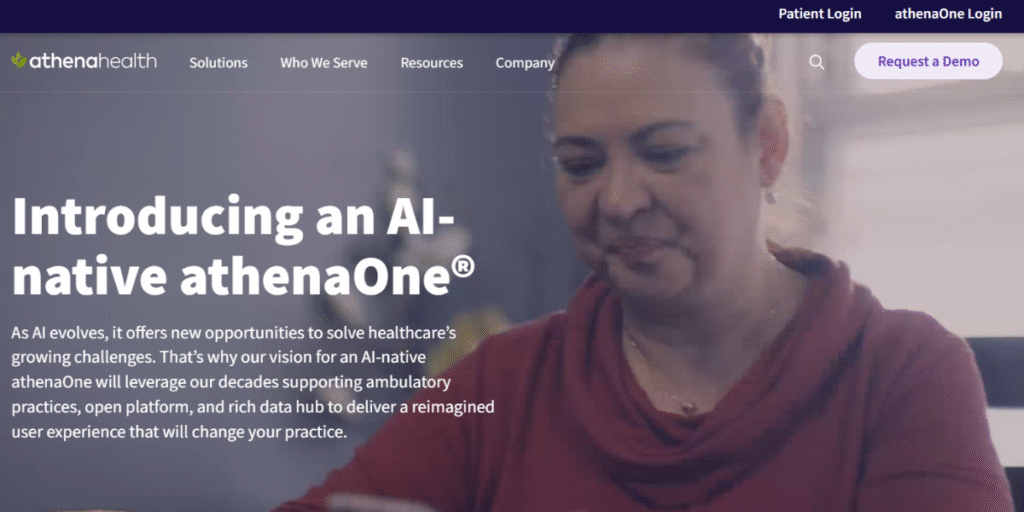
athenahealth creates cloud-based Healthcare Software that helps medical practices work better and make more money. Their system integrates patient records and practice management and billing services. The application is cloud-based, meaning that physicians do not have to purchase costly computer servers. athenahealth aims at automating everyday procedures that allow employees to provide more services to patients.
They have quality care measurement and patient population management tools in their system. The patient engagement attributes enable individuals to make appointments online and interact with their care teams. athenahealth utilizes data to assist practices in improving patient care and financial outcomes.
Specialization:
- Cloud-based solutions
- Ambulatory practices
- Revenue cycle services
Founded: 1997
Headquarters: Watertown, Massachusetts
Best For: Ambulatory practices
Highlights:
- Internet-based platform
- Automatic workflows
- Performance insights
- Patient engagement
4. NextGen Healthcare
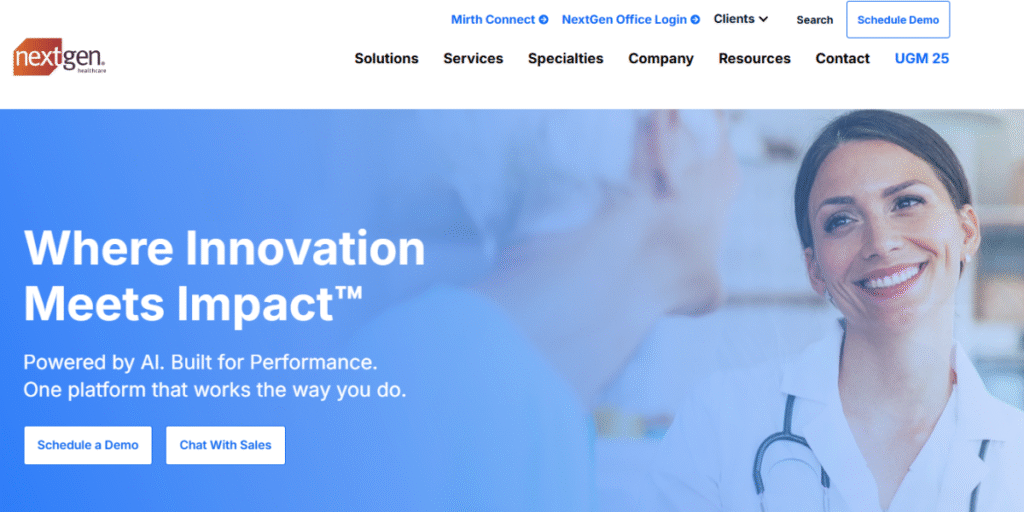
NextGen Healthcare makes Healthcare Management Software designed for doctor offices and specialty medical practices. They have patient records, practice management and patient communication tools that have smart clinical decision support. NextGen has specialized templates and workflows available to the various medical specialties such as heart, bone, and mental health doctors.
It has tools that assist practices in managing their billing and code that allows them to receive appropriate payments. The patient portal available on NextGen also enables effective communication and self-service services, whereas their mobile applications enable patients to access crucial information on the point of care. The software is user-friendly and can be tailored to the specific practice requirements and clinical processes.
Specialization:
- Ambulatory practices
- Specialty-specific solutions
- Clinical decision support
Founded: 1997
Headquarters: Atlanta, Georgia
Best For: Specialty practices
Highlights:
- Specialty templates
- Mobile apps
- Billing features
- Quality reports
5. Cerner Corporation (Oracle Health)
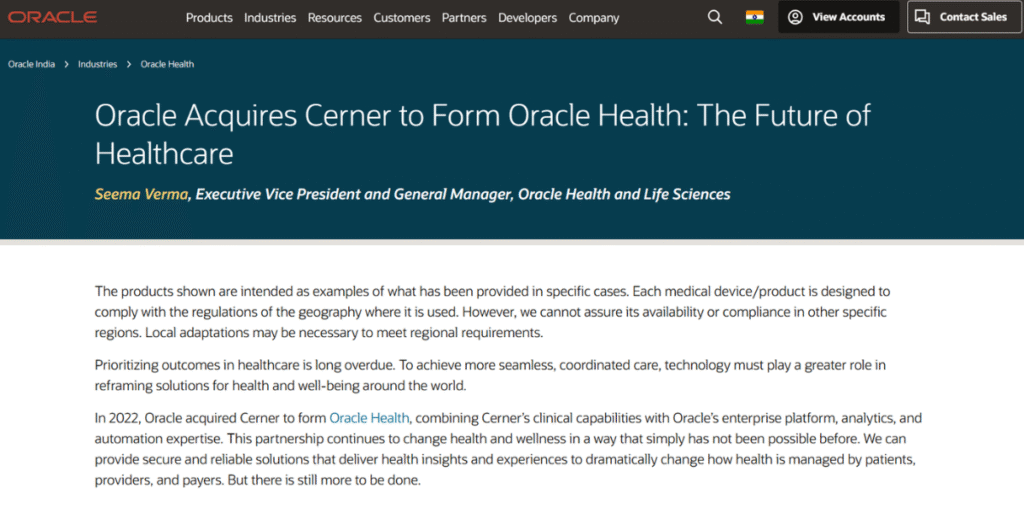
Cerner, now part of Oracle Health, provides comprehensive Healthcare Management Software that serves healthcare organizations across different care settings. Their system is a combination of clinical documentation, health information sharing and population health management capabilities. The software of Cerner is designed to allow real-time access to patient information and assist in making evidence-based clinical decisions based on the advanced analytics.
The system has good interoperability capabilities which ensure that data can be shared easily between healthcare providers and systems. PowerChart is a platform by Cerner that offers intuitive interfaces and customizable workflows that help clinicians to become more productive. Their solutions accommodate the different healthcare environments such as hospitals, clinics and long term care facilities with scalable architecture.
Specialization:
- Health Information Exchange
- Population Health
- Clinical Documentation
Founded: 1979
Headquarters: Kansas City, Missouri
Best For: Health systems
Highlights:
- Real-time analytics
- Data sharing focus
- PowerChart platform
- Flexible architecture
6. MEDITECH
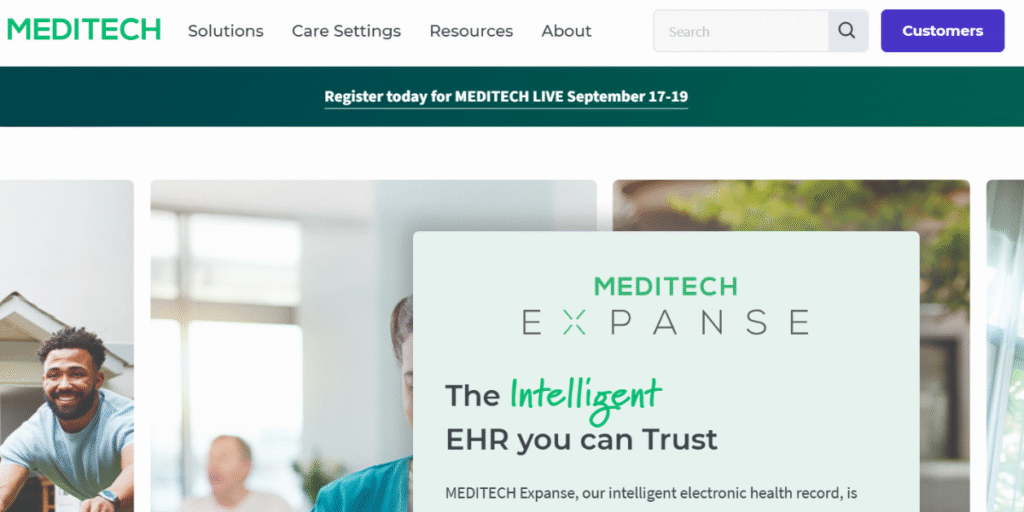
MEDITECH provides innovative Healthcare Software that combines electronic health records with comprehensive clinical and administrative tools. Their Expanse platform provides cloud-based technology and easy-to-use interfaces that are clinician efficient. MEDITECH software is adaptable and is used in small hospitals and major health systems.
Clinical decision support, tracking quality measures, and patient safety functionality are all available on the platform. Their patient portal facilitates access to health-related information and contact with care teams in a safe manner. MEDITECH puts an extra stress on the interoperability and data sharing capacity and keeps a high degree of attention to the user experience and streamlining clinical processes to enhance the outcomes of patient care.
Specialization:
- Cloud-based EHR
- Clinical efficiency
- Patient safety
Founded: 1969
Headquarters: Westwood, Massachusetts
Best For: Small hospitals
Highlights:
- Expanse platform
- Cloud deployment
- Clinical decision support
- User-friendly interface
7. AdvancedMD
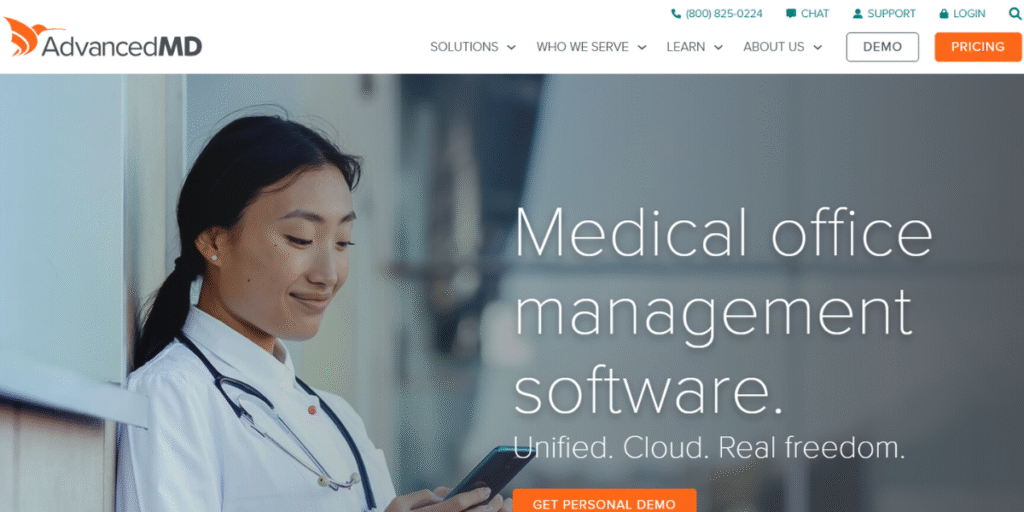
AdvancedMD is a company that specializes in cloud-based Healthcare Management Software targeted at the small to medium-sized medical practices. Their unified solution integrates practice management, electronic health records and patient engagement tools with telemedicine features. The software of AdvancedMD provides the automated workflows that facilitate the process of scheduling, billing and clinical documentation. The system has in-service reporting, quality measures tracking as well as revenue cycle management features.
They have a patient portal which gives easy access to scheduling appointments, secure messaging, and medical records. AdvancedMD focuses on the simplicity of the software and fast deployment, as well as offering continuous support and training. The mobile accessibility of the platform allows healthcare providers to retrieve important information anywhere or at any point on any device.
Specialization:
- Small practices
- Cloud-based solutions
- Integrated platform
Founded: 1999
Headquarters: Salt Lake City, Utah
Best For: Small practices
Highlights:
- Automated workflows
- Telemedicine integration
- Mobile accessibility
- Quick setup
8. eClinicalWorks
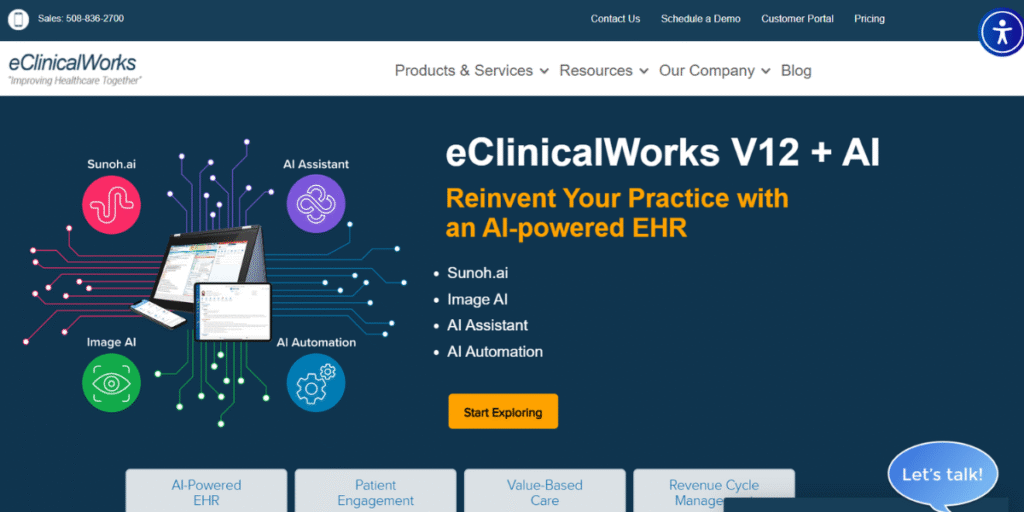
eClinicalWorks is a provider of an effective Healthcare Software system, which combines the electronic health record, practice management, and patient engagement functionality. Their system supports healthcare facilities (both large and small) with cloud-based and on-premises implementation solutions. eClinicalWorks software is a system that has sophisticated clinical decision support, quality reporting and population health management functions.
The system also has templates and workflows specific to various medical specialties and types of practices. Their patient portal allows safe communication, scheduling appointments, and access to medical records, and eClinicalWorks also focuses on interoperability and health information exchange, as well as offers powerful security functions and features of regulatory compliance to manage healthcare holistically.
Specialization:
- Comprehensive EHR
- Practice management
- Population health
Founded: 1999
Headquarters: Westborough, Massachusetts
Best For: Various practice sizes
Highlights:
- Cloud deployment options
- Specialty templates
- Health information exchange
- Security compliance
9. DrChrono
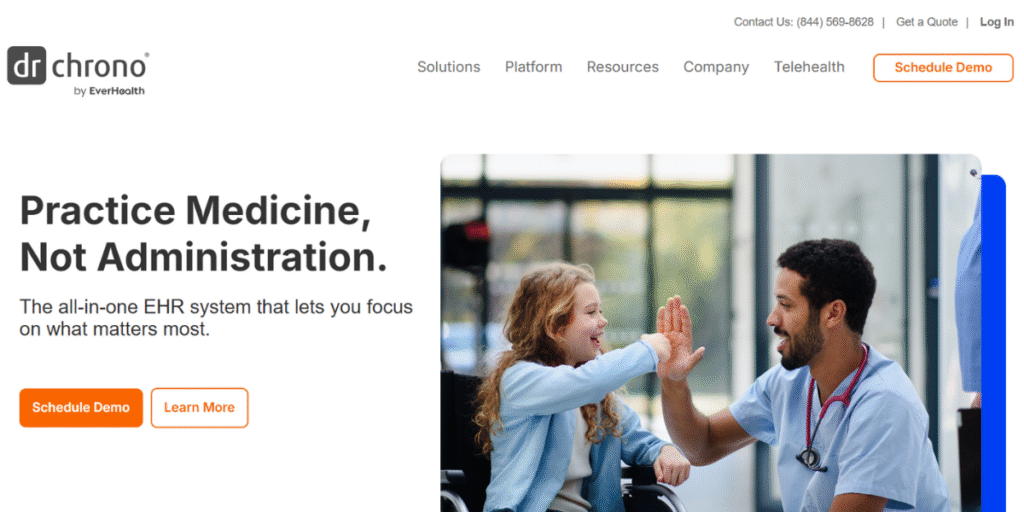
DrChrono provides modern Healthcare Management Software with a focus on mobile-first design and user experience. They have an electronic health records, practice management, and medical billing platform that integrates with novel features such as iPad-based clinical documentation.
The software developed by DrChrono has a customizable template, automated workflows, and integration with other third parties. It has a patient portal system, telemedicine system, and revenue cycle management system. They focus on being easy to use and deploy and offer full-fledged clinical and administrative capabilities in their platform. The mobile applications of DrChrono allow healthcare providers to have access to patient information, record encounters as well as practice operations wherever they are.
Specialization:
- Mobile-first design
- iPad integration
- Cloud-based platform
Founded: 2009
Headquarters: Mountain View, California
Best For: Tech-savvy practices
Highlights:
- Mobile applications
- Customizable templates
- Third-party connections
- Modern interface
10. Practice Fusion (Veracyte)
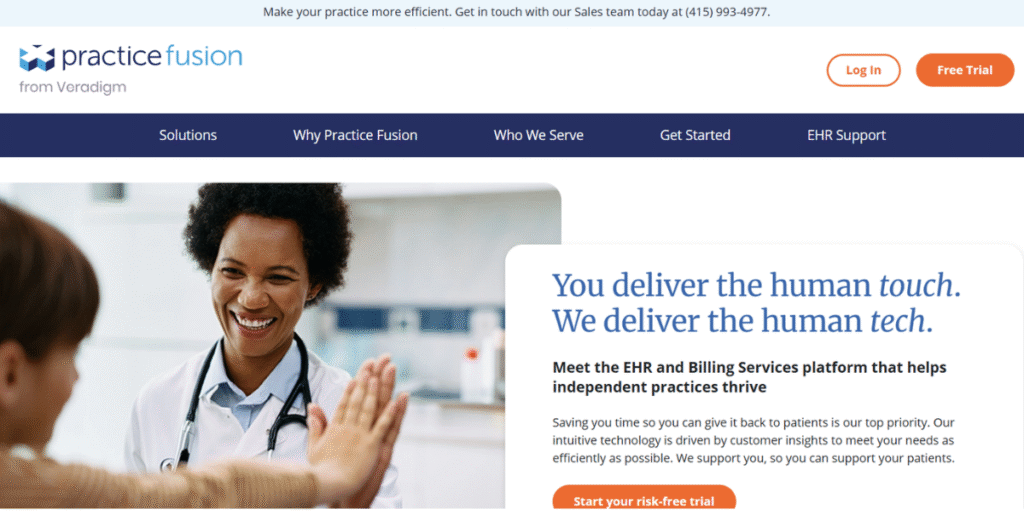
Practice Fusion provides Healthcare Software in the form of cloud-based software for small to medium medical practices who want to acquire cost-effective and efficient healthcare technology. Their platform uses integration between electronic health records and practice management tools and patient engagement capabilities.
The software of Practice Fusion has easy-to-use interfaces, workflow automatization, and extensive capabilities of clinical documentation. The system has e-prescribing capability, lab systems and quality reporting. Their patient portal allows avoiding unsecured communication and providing access to health information and contributing to the patient engagement programs. Practice Fusion is focused on affordability and implementation simplicity in addition to delivering the necessary capabilities in clinical and administrative functioning of an ambulatory healthcare environment.
Specialization:
- Cost-effective solutions
- Small practices
- Cloud-based EHR
Founded: 2005
Headquarters: San Francisco, California
Best For: Budget-conscious practices
Highlights:
- Affordable pricing
- Easy setup
- Lab connections
- Quality reports
Pros and Cons of Healthcare Management Software
Pros
- Speed: Helps to make work much faster and automated to spend less time on paperwork and make the staff concentrate more on patient care.
- Accuracy: helps to avoid errors by automatically validating information, alerting about drug-related issues and maintaining consistent records throughout all departments and providers.
- Access: The access gives immediate access to patient data wherever one is in the hospital or clinic, enhancing the coordination among various medical personnel.
- Rules: Helps hospitals are governed by health laws and privacy regulations and maintain detailed records, which would demonstrate compliance at the time of government inspections and audits.
Cons
- Money: Has upfront expenses of purchasing software, training employees and implementation of systems which may be costly with small practices.
- Learning: It will require time to train the staff on the new systems to work with, and in the meantime, work will become sluggish and the staff will need continual training as software is constantly upgraded.
- Technical Problems: May stop functioning because of computer difficulties, internet connectivity issues or power failures, which may interfere with patient care and operations.
- Installation: Will need significant modifications and alteration to integrate with existing systems and to fit the needs of particular practices, which adds to the cost and time of implementation.
Best Practices for Choosing Healthcare Management Software
The choice of Software must be done carefully keeping in mind your needs and your budget. The healthcare reporting and analytics software will grow to 7.7 billion dollars in 2034. There are a number of vital factors that healthcare organizations need to consider in order to achieve successful implementation and good payback.
- Planning: Sketch your work processes as they are, find the points of trouble, and figure out just what you want the software to accomplish, and then go to the options.
- Compatibility: It is important to ensure that new software does not cause any data transfer issues by ensuring that it is compatible with your current computer systems, medical devices, and other programs.
- Growth: Select software which can expand with your organization, to accommodate more patients and services, without costing them to upgrade the entire system in the future.
- Training: Check on the type of assistance and training that the software company will offer you so that your employees are able to learn how to operate the system.
- Security: ensure the software has good security, data encryption, and complies with all the laws surrounding privacy of healthcare in order to ensure that information regarding patients is secured in the most appropriate way.
Conclusion
Healthcare Management Software has transformed the way hospitals and clinics operate as it has made the work of the hospitals and clinics to be faster, safer and more efficient. It is estimated that the market size of healthcare IT in the world will be 1834.3 billion dollars in the year 2030 with the market expanding at the rate of 15.8 percent per year.
These computer systems have become important instruments of both small and large organizations in the medical field, including small doctor offices and large hospital networks. Management Software helps medical staff spend less time on paperwork and more time caring for patients.
These software tools will be enhanced with the help of artificial intelligence and machine learning to make healthcare even greater as technology is continuously evolving. Organizations that invest in good Management Software today will be ready for the future of digital healthcare while providing better care to their patients and staying competitive in the medical field.
FAQs
What does Healthcare Management Software do?
With the use of the Software, hospitals and clinics can manage the volume of patient data, appointments, billing, and boost patient care with the help of digital tools.
How does Healthcare Management Tool help patients?
It accelerates the access to the full medical history of doctors, decreases medical errors, and allows the healthcare providers to make more accurate treatment decisions.
What types of Healthcare Management Tool is available?
The primary categories are patient record EHR systems, hospital management operational software, clinic-based practice management, and telemedicine to provide remote care.
How much does Healthcare Management Tool cost?
The prices are extremely diverse according to the features and size of practice, starting at a few hundred and reaching several thousand dollars monthly per provider.
What should I look for when choosing Healthcare Management Software?
The compatibility with your current systems, compatibility with your ability to expand with your practice, security features, training support, and compliance with your individual needs are the important factors.
